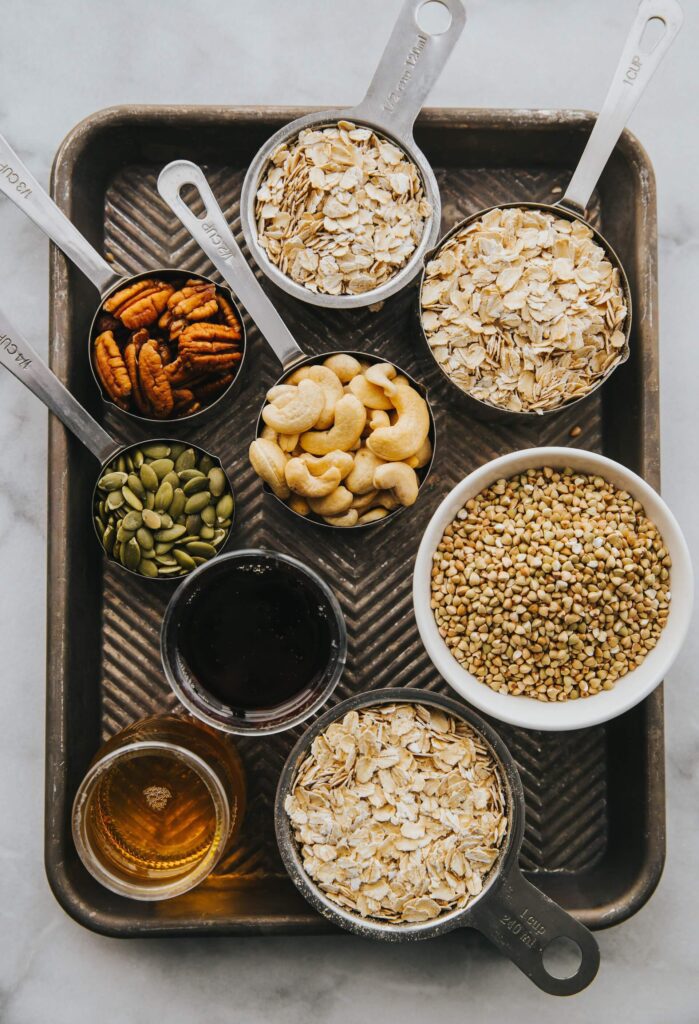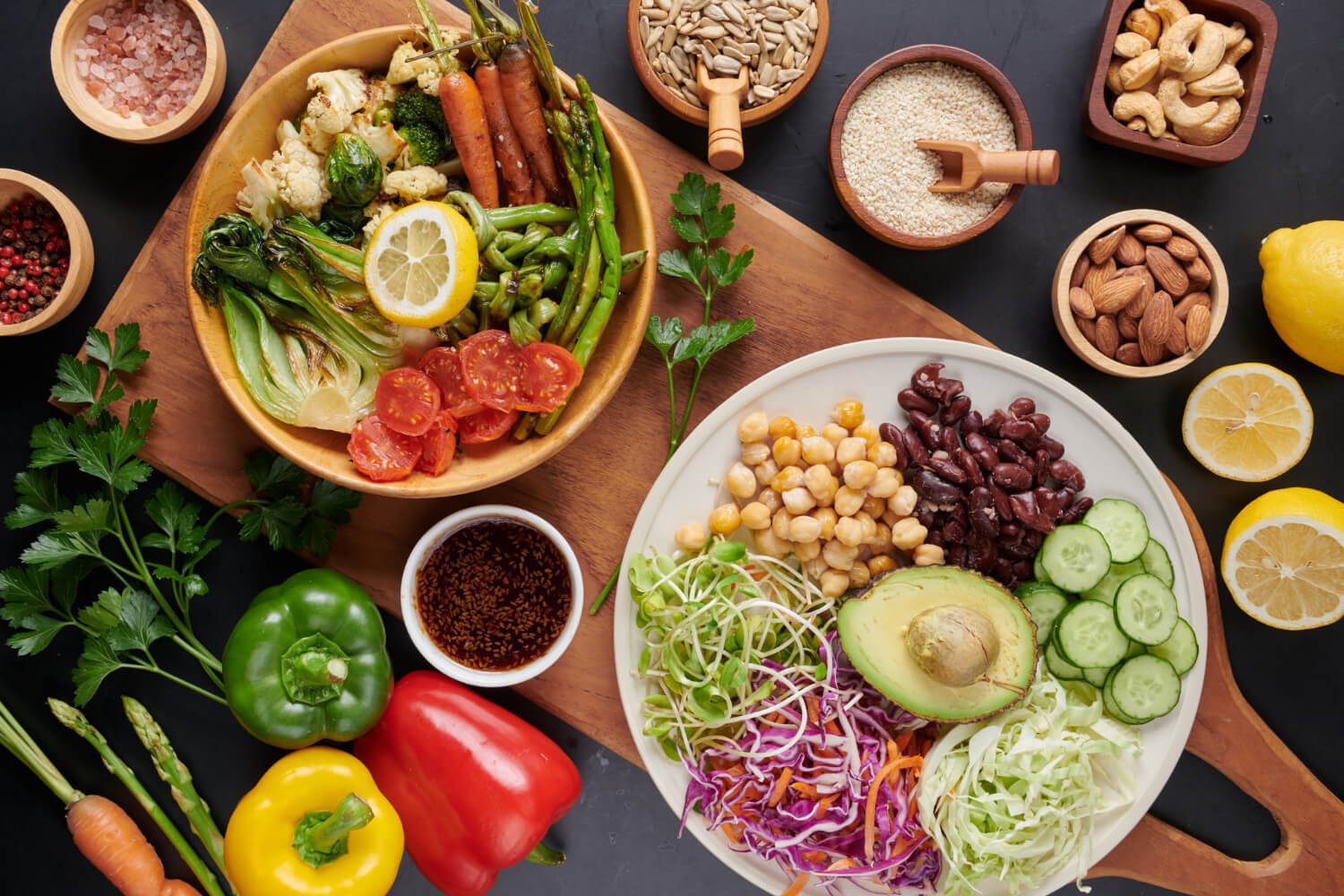Melissa Mitri, MS, RD, is a registered dietitian nutritionist, weight loss specialist, and expert health writer with over 15 years of experience in the health and wellness industry. Melissa has worked in a variety of healthcare settings where she helps clients improve their diet through an individualized approach.
Are you confused by all the conflicting nutrition information out there and don’t know which nutrition trends to ditch? Do you need to go gluten-free? Do carbs make you fat? Should you avoid eggs? Today I’ll help dispel the most common nutrition trends and share the facts you need to know.
As a Registered Dietitian, I’m always keeping up with the latest nutrition science and diet trends out there. It’s essential to look at every nutrition trend with a critical eye and to know the source of information. Unfortunately, there are all sorts of potential biases out there and plenty of unqualified people dispelling nutrition advice.
This can lead to you feeling confused, overwhelmed, and delay you in making important health decisions because you aren’t sure which path to take.
Not to worry – I’m here to clear up the confusion and lead you on the path to better health and wellness. Let’s dive into the top 5 nutrition trends to ditch and what to do instead.
1. Carbs make you fat
Do you fear carbs because you’re afraid eating them will make you gain weight? I have so many conversations with my clients about this – and it’s simply not true.
Will eating too many carbs make you gain weight? You bet. But eating too many calories from fat or protein will have the same effect.
Carbohydrate-containing foods are broken down into glucose when digested. Glucose is our body and brain’s preferred energy source for all of its vital functions. It also is the most optimal fuel source for workout performance. So why does it get such a bad rap?
Well, there are many types of carbs – and many of the types we commonly eat tend to spike our blood sugar, increase cravings, and are not the most nutritious. These include carbs that are highly processed and stripped of many of their beneficial nutrients such as bagels, muffins, packaged cereals, and white bread.
However, there are plenty of beneficial carbs available for you to enjoy and that your body needs. These include:
- Whole-wheat or whole-grain bread
- Brown rice, quinoa, bulgur, barley, or farro
- Potatoes (yes, even white potatoes get the green light for nutrition and fiber!)
- Fruit
- Whole-grain, high-fiber cereal (Nature’s Path Heritage Flakes and Grape Nuts are my favorites)
Bottom line – Include at least one of these carbs with every meal, and eat the others more sparingly for optimal health.
2. Gluten-free is healthier
If you’ve jumped on the gluten-free bandwagon because you heard it’s better for you, you’re not alone. But is it really necessary for everyone to restrict gluten? Absolutely not!
The gluten-free diet is one of the top nutrition trends because well, a lot of celebrities follow it. There is no scientific evidence you need to go gluten-free unless you have celiac disease or gluten sensitivity. In both of these cases, your body doesn’t tolerate gluten like the average person.
With these conditions, you will need to completely avoid gluten (with celiac) or limit it as much as possible (with gluten sensitivity). This will help reduce inflammation and help prevent unwanted side effects like bloatedness and diarrhea.
But if you don’t have these conditions, going gluten-free won’t make you healthier. In fact, many gluten-free items are higher in sugar or fat to try to compensate for the change in flavor and texture from the removal of gluten.
One research study even showed that those following a gluten-free diet consumed significantly more calories in a given day! Gluten-free products also tend to be more expensive than their gluten-containing competitors.
Bottom line – For most people, gluten is harmless and does not need to be avoided in the diet.

3. Eggs will raise your cholesterol
This is probably one of the most confusing nutrition trends to date – are eggs good or bad? Are they too high in cholesterol? Should you just have the white and skip the yolk?
For most people, this is one of the top nutrition trends to ditch. This is because eggs are completely safe and quite beneficial. But if you’re in a smaller subset of people – you may want to minimize your intake of egg yolks.
Here’s the skinny – yes, egg yolks are high in cholesterol. But, they are also high in many other health-promoting nutrients like vitamin A, vitamin B12, selenium, and choline, a lesser-known mighty nutrient.
Choline is a compound similar to a B vitamin in structure and has been seen to be beneficial for cognition, memory, and heart health. And eggs are one of the best food sources of choline.
For most people, these health-promoting nutrients appear to counteract the small effect of eggs on cholesterol levels.
The exception is if you are considered a cholesterol “hyper-responder.” These are people in studies that were seen to have a stronger, more negative reaction to high cholesterol intake. If you have high cholesterol levels or this runs in your family, you may be in this category.
Bottom line – Consult with your doctor for guidance about your cholesterol intake. But if you aren’t at risk for high cholesterol levels, the pros of enjoying 1-2 whole eggs per day will likely outweigh any small potential risks.
And if you can’t eat eggs or don’t like them, you can get in many of their healthful nutrients from a daily multivitamin and choline supplement.
4. High-fructose corn syrup is the devil
High-fructose corn syrup, or HFCS, has been demonized for quite some time now. Is it really that bad?
Well, it’s not necessarily good for you and shouldn’t be overconsumed. But the same goes for any type of sugar – whether that’s white table sugar, sugar in the raw, honey, or maple syrup. HFCS gets a bad rap because it tends to be found in many high-calorie, highly processed foods that are associated with health problems. But these foods also contain many other unhealthful sugars and additives that contribute to these effects.
Too much sugar of any kind has been associated with obesity, inflammation, and chronic medical conditions like diabetes and heart disease. So watching your intake is important.
Bottom line – Sugar is sugar. Limit your intake of any source of sugar to 6 teaspoons a day if you’re a woman or 9 teaspoons a day if you’re a man. HFCS is not any worse than any other sugar.

5. You don’t need supplements
As a Registered Dietitian, I always promote a food-first approach when it comes to nutrition. But I also know that most people don’t get enough of what they need from food alone. Because of this, I recommend supplements for most of my clients as well.
The most common supplements I recommend for general health are multivitamins, probiotics, and immune-supporting products such as elderberry. Depending on the person, I may recommend others such as vitamin D, fish, oil, or other vitamins, minerals, and herbs based on their health status and dietary intake.
Bottom line – While the food you eat is certainly important, don’t rule out supplements to help you fill in any nutrient gaps.
Final words
The field of nutrition science is ever-evolving and it can be hard to separate fact from fiction. But the truth is that there are many nutrition trends to ditch that out that don’t have much clout, and many of them are stemmed from celebrities and food industry-funded studies.
Always take diet trends you hear with a grain of salt, and consult with a Registered Dietitian for individualized guidance.
Don’t believe everything you hear – and remember that a healthy diet is all about the basics – fruit, vegetables, lean meats, and whole grains. Food shouldn’t be feared and is meant to be enjoyed!

Melissa Mitri, MS, RD, is a registered dietitian nutritionist, weight loss specialist, and expert health writer with over 15 years of experience in the health and wellness industry.
Melissa has worked in a variety of healthcare settings where she helps clients improve their diet through an individualized approach.
- Latest Posts by Melissa Mitri, MS, RD
-
Planning Healthy Meals On A Budget
- -
5 Worst Foods For Arthritis
- -
5 Easiest Fruits and Vegetables to Grow, and Which To Buy
- All Posts

